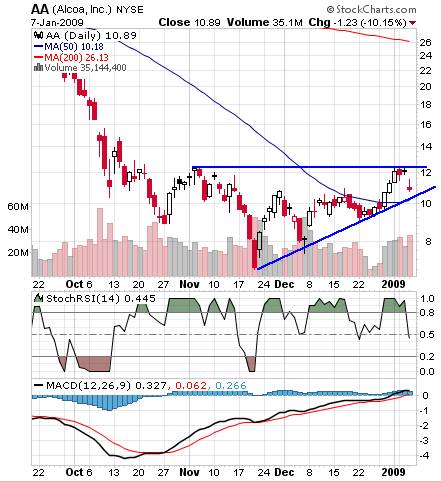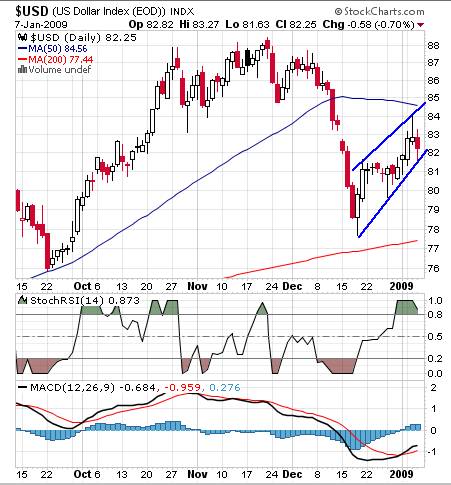U.S. Unemployment: The Great Year-End Jobs Blowout
Economics / Recession 2008 - 2010 Jan 09, 2009 - 08:00 AM GMTBy: Oxbury_Research

 1.1 Million Gone in Only 60 Days… In December, no less than 693,000 jobs disappeared from the private non-farm payrolls, a dramatic and disturbing increase from the 476,000 jobs lost in November. More than one million unemployed persons in two months would cripple most countries and throw them into a major depression, but even in a nation of 300 million persons this is a disturbingly large increase.
1.1 Million Gone in Only 60 Days… In December, no less than 693,000 jobs disappeared from the private non-farm payrolls, a dramatic and disturbing increase from the 476,000 jobs lost in November. More than one million unemployed persons in two months would cripple most countries and throw them into a major depression, but even in a nation of 300 million persons this is a disturbingly large increase.
The decline was the worst in the history of the monthly ADP Employer Services survey, which began reporting in 2001. And if its results are matched by the official government labor report on Friday, it would be the biggest employment drop since 1975's unwelcome and unhappy recession. Yes, that's more than 30 years ago . This ongoing crisis is now approaching once-in-a-generation status and its still mushrooming like a bad case of fungus in spoiled food.
America 's large services sector took the biggest hit (473,000 jobs) with the goods-producing sector (220,000 jobs) and manufacturing (120,000) following in second and third place. Even the seasonal hiring for the holiday season wasn't enough to make any kind of impression.
But of course, the employment report with real weight is the government report due on Friday. If ADP's survey is matched by the BLS, that's when the brown stuff will really hit the fan. And it's not particularly reassuring that last month's government report showed a loss of 533,000 jobs against a forecast of 320,000.
And since the new forecast is already -500,000, just how bad will it really be? Is ADP right?
America is not alone in rising joblessness, however. German unemployment rose by 18,000 last month, significantly higher than the 10,000 losses that had been expected and lifting the jobless rate to 7.6%. Germany is Europe 's largest economy and is now showing its first increase in joblessness since February 2006.
Alcoa's Angst and Anguish
Alcoa Inc. operates in 42 countries as a major producer of primary aluminum, fabricated aluminum, and alumina, with aluminum and alumina representing approximately three-quarters of Alcoa's revenues. The company's products are used worldwide in aircraft, automobiles, commercial transportation, packaging, consumer products, building and construction, and industrial applications.
In short form: this is a company closely integrated with one of the most basic commodities of the economy across multiple key industries. And just yesterday it announced that it will be cutting 13,500 jobs ( 13% of its global workforce ).
It's also cutting its smelting output by 18%, freezing salaries and hiring, and selling four non-core downstream businesses, all in a bid to reduce its 2009 capital expenditures by a whopping 50%.
Yes, 50%. This is not the sign of a mild dip in the economy. This is a disaster, as evidenced by the 10%+ drop in the stock price after this news was released:

Technically, the stock price hit a ceiling at $12 again and looks to test support at the $10 level. If it holds above its 50 day moving average (and the lower boundary of the ascending triangle drawn in blue) then a bounce is possible. Ascending triangles are normally bullish, after all, and AA has already been brutally pounded by last year's ferocious bear market.
However, it's more likely is that the stock will stagnate at this level before drifting even lower. A company that needs to trim 50% of its capital expenditures is not a company which is primed for growth at any foreseeable point in the future. This is a survival action with management looking several years into the future.
"Buddy, Can You Spare $1 Trillion?"
The 2009 federal budget deficit will indeed exceed $1 trillion and reach $1.186 trillion according to the non-partisan Congressional Budget Office (CBO).
This is the largest deficit on record at 8.3% of GDP, and it doesn't even include the extra $800bn spending being planned by US President-elect Barack Obama. (By comparison, last year's deficit was a "mere" $455bn and the previous percentage of GDP was 6% in 1983.)
This added financial burden will only lead to increased debt costs for government, increased inflation (which has barely begun to register on the average American's finances), a weaker dollar (unless everyone else devalues their paper even faster) and will almost certainly lead to higher taxes and spending cuts in the future.
And so the prognosis for the long term value of the US dollar is bleak, to put it mildly. You can't even hold dollars and feel safe (never mind invest them) since the Federal has already cut interest rates to nearly zero in a bid to stimulate the economy.
Right now the US dollar index is in a bearish flag formation which will likely top out at the 85 level. Once the lower boundary is breached (see the blue trendlines on the chart) then expect the lows from September to be tested and perhaps even breached.

Is The Euro The World's Currency Savior?
With the dollar looking so grim, will the euro take over as the new reserve currency? Possibly, but unlikely unless the ECB takes some serious measures to strengthen the currency rather than undermine it with interest rate cuts. It also needs a bit more of a track record: the relative baby of the paper currency world is currently only 10 years old as of New Year's Day this year.
However, it's potentially a very hard currency (as in backed by hard assets), as the Eurozone owns more than 36% of the world's official gold reserves and one-third as much as the amount of gold held by the Fed. And to its credit, the ECB has been less inflationary with its policies than the Fed. Over the last decade, the euro has been inflated by 9.8% annually as compared to 11.8% annually for the U.S. dollar.
But until the ECB acts to establish a formal link between paper and gold, inflation will continue to gnaw away the purchasing power of the people using it.
While we don't expect hyperinflation in the Eurozone or the USA , we do expect inflation to get a great deal worse -- perhaps even bad enough to force one of the major central banks to serious consider formal gold backing to restore faith in their offerings.
When that happens, we will know a new era has been truly ushered in. There isn't enough pain yet for this dramatic event to occur, but we strongly suspect that this will in fact happen before this global crisis is truly over.
Good investing,
Disclosure: no positions
Nick Thomas
Analyst, Oxbury Research
Nick Thomas is a seasoned veteran of technical analysis and has mastered all intra-day trading in stocks, options, futures and forex. He prefers to scout investments as one asset class of many and shapes his investment strategies accordingly. He writes extensively about offshore banking and offshore tax havens and is active in the career development field of independent investment research.
Oxbury Research originally formed as an underground investment club, Oxbury Publishing is comprised of a wide variety of Wall Street professionals - from equity analysts to futures floor traders – all independent thinkers and all capital market veterans.
© 2009 Copyright Oxbury Research - All Rights Reserved
Disclaimer: The above is a matter of opinion provided for general information purposes only and is not intended as investment advice. Information and analysis above are derived from sources and utilising methods believed to be reliable, but we cannot accept responsibility for any losses you may incur as a result of this analysis. Individuals should consult with their personal financial advisors.
Oxbury Research Archive |
© 2005-2022 http://www.MarketOracle.co.uk - The Market Oracle is a FREE Daily Financial Markets Analysis & Forecasting online publication.
Comments
|
rwa
09 Jan 09, 20:28 |
Alcoa
Alcoa is going to 3.50. The USD is going to 94 |


